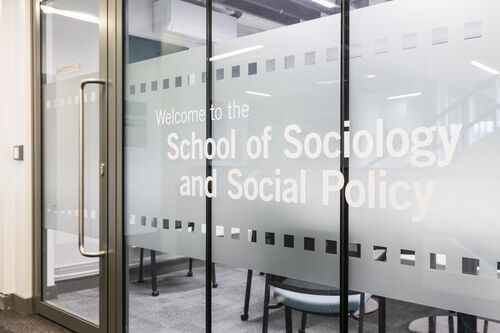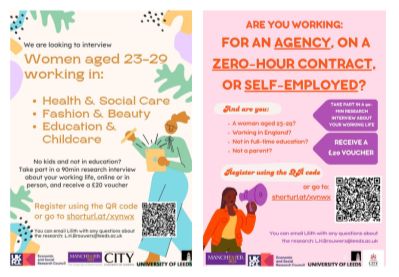Researchers from Sociology and Social Policy contribute towards field striving for Gender Equality

As we near the end of Women's History Month 2025, we would like to take the chance to reflect on some of the relevant research from colleagues across the School of Sociology and Social Policy.
Celebrating women
Women's history month has occurred annually in March since 1987, and celebrates the contributions made by women to history, culture, and society. It has also provided the opportunity to reflect on matters of gender equality in present society. This article sheds light on some of the academic staff and researchers within the School of Sociology and Social Policy who have made significant contributions to the field of gender studies and equality in recent years.
A multi-disciplinary approach to gender studies
The Centre for Interdisciplinary Gender Studies (CIGS) at the University of Leeds brings together over 170 academic staff from the arts and humanities, social sciences, medicine, and healthcare studies. The centre enjoys excellent connections with Gender and Women’s Studies departments at universities regionally, nationally, and internationally, and many of their students and visiting academics are from countries in Africa, Asia, Europe, and the Americas. At present, Dr Patricio Simonetto (Lecturer in Gender and Social Policy) is the Director of CIGS.
A Trans History of Argentina
Dr Patricio Simonetto recently won the Sylvia Rivera Award in Transgender Studies for his monograph, A Body of One's Own: A Trans History of Argentina (University of Texas Press, 2024) a history of the Latin American centred on the experiences of trans people, more visibly trans women. This was awarded by ‘The Center for LGBTQ Studies at the Graduate Center, CUNY. His monograph examines how trans bodies were understood, policed, and shaped in a country that banned medically assisted gender affirmation practices and punished trans lives.
For more information about A Body of One's Own: A Trans History of Argentina click here.
MS and domestic violence and abuse
Dr Andrea Hollomotz and colleagues, have been awarded Editor's choice for their letter to the Editor for Neurology relating to their research initiative surrounding MS and Domestic Violence and Abuse.
The letter referenced the work of the MS and Domestic Violence and Abuse Research Initiative, which includes colleagues and a PGR from the University of Leeds (Dr Andrea Hollomotz, Dr Shruthi Venkatachalam, Kharis Hutchison from the School of Sociology and Social Policy and Professor Helen Ford from Medicine). The project is funded by the Horne Family Charitable Foundation.
Disabled people, regardless of gender, are more at risk of DVA, though it is significantly higher for women. In the United Kingdom, 150,000 people have MS and more than 70% of them are women. However, information about DVA and people with MS is almost non-existent as is research on how they access support. We hope to change that and raise awareness about this issue.
Read the full letter here.
Find out more information about the MS and Domestic Violence and Abuse Research Initiative.
Women in agriculture
Women have always played a role in UK agriculture, but often this has been invisible due to prevailing stereotypes of a good farmer being a man and land ownership being passed from father to son. Dr Bethany Robertson’s (Lecturer in Sociology and Social Policy) research about the lived experiences of women farmers in England offers an insight into the legacy of gendered occupations and the challenges and opportunities faced by women as they take the lead in producing the nation’s food.
You can read more about Bethany’s research here.
Earning while learning
Colleagues from the School of Sociology and Social Policy, Dr Kim Allen and Dr Lilith Brouwers, along with a wider research team working across Employment Studies, Youth Studies and Sociology of Education, have been involved in a study funded by the Economic and Social Research Council (ESRC). This three-year project titled ‘L-earning: rethinking young women’s working lives’ studies young women's earliest experiences of work, including paid work while studying, and how these experiences may contribute to gendered inequalities in later life.
One of the research findings is that young women are about 50% more likely to engage in paid work while studying than young men. This means that young women are more likely to be managing the challenges of earning while learning.
Additionally, the research has found that pay is often low for both young men and women, with no significant pay gap. However, gendered norms and expectations appeared to make it harder for young women to raise issues around pay.
Another finding is that sexual harassment at work is widespread for young women and comes from both co-workers and customers. These experiences were rarely reported or addressed appropriately by managers.
I’d say the main issue is harassment... I’ve worked in a lot of bars and clubs and I find that the harassment is really, really, bad, like people will touch you, people will .... they’re very persistent and you can’t – like I have the authority to get someone to call and get them banned, it’s not difficult, but you also kind of can’t do it to every single person, because they’re your money, they’re your clients. Sometimes you just have to suck it up, which is not great.
The research team submitted evidence to the Low Pay Commission about the impact of low pay on young workers (including student workers) and how young women experience and negotiate national minimum wage levels, including the national minimum wage youth rates. This research submission was cited in the 2024 Low Pay Commissions Annual Report to Government.
Find out more on the research project’s website.
Gendered professions
Researchers from the ESRC Project ‘L-earning: Rethinking Young Women’s Working Lives’ are currently interviewing young women aged 23-29 in gendered work: jobs where the overwhelming majority of workers are women. This means they interview nail technicians, teachers, physiotherapists, social workers, fashion designers, nurses, home carers, nannies, beauty executives, and many more. One of the emerging findings is that quite a few of these jobs pay so little that many women are dependent on their parents or partners for housing or financial stability. This low pay stands in stark contrast to the fact that many of these roles not only require specialist qualifications or degrees, but also that workers in many of these roles hold high levels of responsibility for the health or wellbeing of patients or children. The research has also found that young women really value work-life balance, and for quite a few of them this comes from personal experience of burnout in prior workplaces.
Do you know or are you a woman aged 23-29 working in Beauty, Fashion or Healthcare? The research group is still looking for 25 more young women to interview. You can register your interest here.

Research flyers
Gender and sexuality on the dancefloor
Dr Yen Nee Wong is a queer feminist researcher working at the intersections of media and culture, gender, sexuality, sociology of the body, queer theory, and sociology of dance. Dr Yen Nee Wong’s 2024 book Equality Dancesport: Gender and Sexual Identities Matter (Routledge, 2024) draws on a queer feminist lens to present a sociological framework for understanding how gender and sexuality is materialised through the dancing bodies of competitive ballroom dancers.
For further information, read the spotlight interview with the author.
Follow the School of Sociology and Social Policy on Bluesky.




